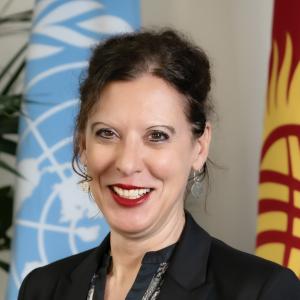Statement of the UN Resident Coordinator, Ms Antje Grawe, on the occasion of the National Development Forum
Bishkek, Hyatt Hotel
Excellency Deputy Chairman of the Cabinet of Ministers, dear Edil
Distinguished members of the Cabinet and Parliament
Excellencies, development partners, visiting delegations
Representatives of the civil society and the private sector
Dear colleagues,
It is a great privilege to welcome you here today at this National Development Forum on “Human Capital and Sustainable Development”—a theme essential to Kyrgyzstan’s well-being and prosperity.
Allow me to start by conveying the greetings of the UN Secretary-General, who was invited to the forum and regrets that he could not attend but who acknowledges the importance of the topic and extends his best wishes to all participants.
I also would like to thank the Administration of the President, and the National Institute for Strategic Initiatives for bringing us together, meaning the country’s national and international development partners, to foster critical discussions on Kyrgyzstan’s development priorities and strengthen the partnerships needed to achieve the Sustainable Development Goals (SDGs) in the country.
I would also like to thank my colleagues from the ADB and World Bank for partnering in supporting the organization of this forum and for pooling the expertise available to the country to further advance the sustainable development goals.
This year’s focus on human capital development is particularly pertinent in general as well as for Kyrgyzstan in particular. Human capital—the skills, health, and the knowledge that people acquire throughout their lives—is considered the foundation of sustainable development. It underpins economic growth, social stability, and the achievement of the SDGs.
The recently published 2024 Sustainable Development Report outlines both advancements and ongoing challenges in advancing the SDGs globally. It reminds us that while economic growth, measured by GDP, is important, it only tells one part of the story. A broader perspective on development must include people's well-being, their health, education, and social inclusion. In this regard, I commend the organizers for designing the development forum in a way that captures this spirit.
In choosing the topic for today’s discussion, we can also build on the conclusions from last year’s Development Forum on poverty reduction which already emphasized the importance of creating conditions for inclusive growth, social protection, and decent work, with the Government indicating its readiness to apply the Global Accelerator on Jobs and Social Protection for Just Transitions—an initiative by the UN Secretary-General to foster job creation and extend social protection to those most in need. This commitment is critical, as nearly 30 percent of Kyrgyz citizens still live in poverty.
Today’s forum also provides an opportunity to further substantiate the commitments that President Japarov made at the 2023 SDG Summit—particularly in the areas of inclusive education and the green economy.
Moreover, the forum represents a unique opportunity for Kyrgyzstan to follow up quickly to the Summit of the Future that convened in September of this year in New York, and which underscored the urgent need for transformative action to achieve the SDGs and foster a just and equitable global order. Leaders adopted the Pact for the Future, a landmark commitment to “turbo-charge” sustainable development. The Pact calls for significant investments in social and economic progress for youth, universal access to health and education, and expanded social protections. It recognizes human capital as a driver of global resilience and equitable development and calls upon us to invest in a future that places people and their potential at its core.
Leaders at the Summit also endorsed the Digital Compact, emphasizing the importance of digital skills and lifelong learning, something that is so important for Kyrgyzstan. This links with this year’s forum on equipping the workforce with 21st-century skills, further aligning with the urgent need to adapt to today’s rapidly evolving global economy.
This resonates in particular with Kyrgyzstan’s young dynamic population. With over 35 percent of citizens aged 14 to 35, the country has a unique opportunity, as described by the Prime Minister, to harness the energy and potential of its youth. A prerequisite in this context is that education equips young people with the skills needed in a dynamic world.
Addressing these gaps requires a comprehensive approach to human capital investment, and I am happy to see that the forum applies such a comprehensive lens which also includes migration which plays a significant role in Kyrgyzstan’s human capital landscape. The return of over 120,000 Kyrgyz migrants in recent months presents an invaluable opportunity for economic growth. By integrating migration into national policies, Kyrgyzstan can leverage the potential of these individuals to drive innovation and development.
Ladies and Gentlemen,
A human-centered agenda—placing people at the core of economic and social policies—will be crucial for Kyrgyzstan to fully tap into its potential, building on the economic growth currently experienced. From our perspective, four priorities are particularly relevant:
1. Investing in people’s capabilities through education, lifelong learning, and healthcare;
2. Strengthening labor market institutions to ensure fair wages, social protections, and safe workplaces;
3. Promoting decent and sustainable work that supports both economic growth and environmental stewardship;
4. Enhancing the performance of social sectors—education, health, and social protection—so people can remain active, productive contributors to society.
The Pact for the Future emphasizes the significant importance of partnerships, foresight, and multilateralism in advancing the SDGs. It calls for “strengthening the relationship between the United Nations and international financial institutions, regional and subregional organizations, and other relevant stakeholders” to ensure effective implementation of our shared goals.
By embracing these principles, Kyrgyzstan can foster a collaborative environment that leverages the strengths of all partners, anticipates future challenges, and ensures that development efforts are inclusive and sustainable.
I look forward to today’s discussions, which will surely be an inspiration in this regard. I also hope that it will inspire the new national development strategy currently under preparation to look beyond GDP and to adopt a human-centric and comprehensive approach to human capital development.
Thank you very much.
Speech by











